In 2019, South Korean writer and director Hwang Dong-hyuk pitched Netflix a script for a dystopian thriller about society’s outcasts competing in Korean children’s games for a cash prize.
His story had been snubbed by local distributors 10 years earlier for being too outlandish, but Netflix took a chance on it.
“Squid Game” turned out to be a bargain beyond compare. Made for about $2.4 million an episode, about a fourth the cost of “Stranger Things,” the nine-part series went on to win six Emmys, set a Netflix record of 1.65 billion viewing hours in its first 28 days of release and — according to internal Netflix documents — increase the value of the company by an estimated $900 million.
The show also made Hwang famous — but not rich.
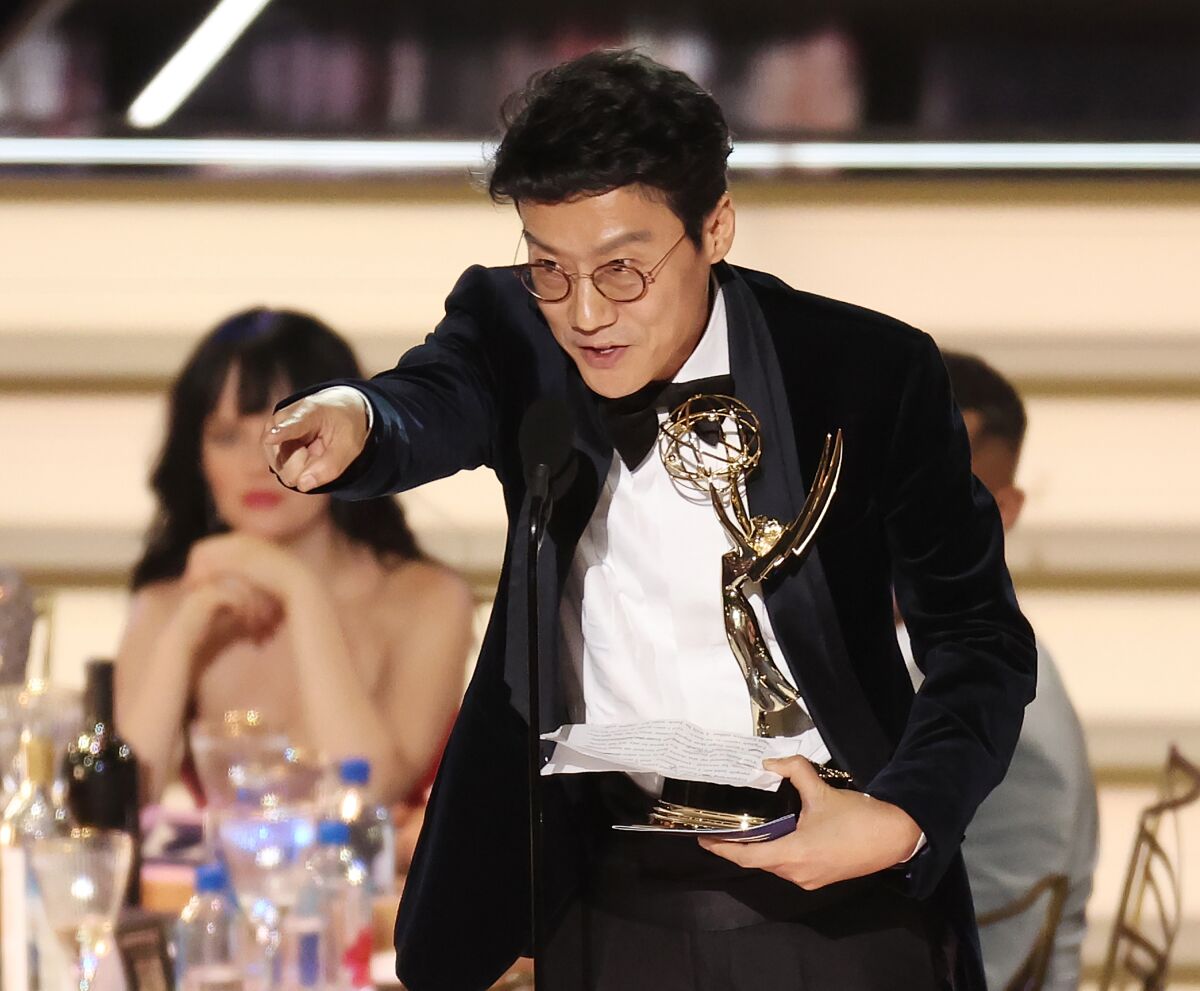
Hwang Dong-hyuk accepts the Emmy for Outstanding Directing for a Drama Series for “Squid Game; Red Light, Green Light ” during the Emmy Awards held at the Microsoft Theater on Sept. 12, 2022.
(Myung J. Chun / Los Angeles Times)
In his contract, he had forfeited all intellectual property rights and received no residuals — royalty payments that writers, directors and actors normally receive when their work is reused after an initial broadcast. He said in an interview that “Squid Game” had earned him “enough to put food on the table.”
Netflix has since become one of the biggest buyers of Korean dramas, and “Squid Game” a byword for the country’s ability to produce what the industry calls “cost-effective” content. South Korea’s other international hits, including “Kingdom” and “Hellbound,” have also been produced on relatively cut-rate budgets while topping the streamer’s leaderboards.
South Korean content is likely to become even more important to Netflix as the streamer turns to its stockpile of foreign titles to weather the ongoing Hollywood writers’ strike.
The 130 or so South Korean productions, including 52 Netflix originals, already rival the company’s library of original Spanish-language programming. Netflix, which estimates that 60% of its 230 million or so subscribers have watched Korean titles, recently announced it would be investing an additional $2.5 billion into South Korean content over the next four years.
Netflix has become the first port-of-call for production companies and creatives looking to pitch their shows, given the streamer’s willingness to take risks and give its creators a level of freedom absent in local television networks. “Squid Game” would never have been made if not for Netflix — a point conceded by Hwang himself.
At the same time, like their U.S. counterparts, South Koreans throughout the nation’s entertainment industry are increasingly questioning the Netflix business model and raising concerns that the country is becoming little more than a bargain bin for the global streamer.
Writers and directors say that lack of residuals should no longer be accepted as the price of admission for working with Netflix, while production workers point to exploitative labor practices that have quietly driven Netflix’s South Korean content boom.
“It all comes down to labor costs,” said Kim Ki-young, president of the Broadcasting Staffs Union, which represents production crews. “There is a staggering amount of unpaid labor being done.”
In a statement responding to questions from the Los Angeles Times, Netflix did not address specific examples but said that responsibility for the fair treatment of crew and creative workers lies with the local partners to which the streamer outsources all of its production.
“We pay fair, highly competitive rates with our K-Content creators and set clear standards for our Korean production partners, who produce all our shows and movies,” the company said. “These standards meet or exceed Korean law.”
::
When Netflix launched in South Korea in 2016, workers and labor activists hoped that the global streamer, accustomed to stricter labor standards negotiated by Hollywood’s unions, would be an uplifting force in an industry notorious for abysmal working conditions.
The labor problems then largely stemmed from the fact that South Korean television dramas aired twice a week, often on back-to-back days.
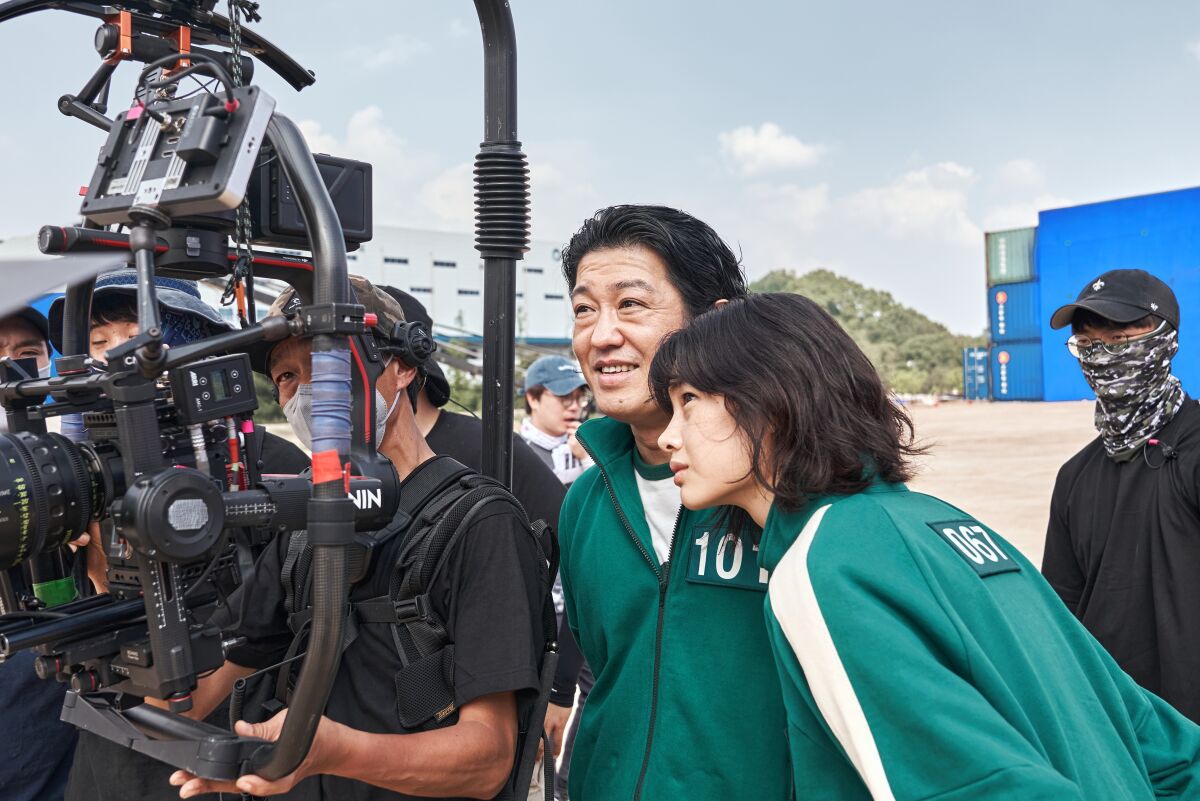
Jung Ho-yeon and Heo Sung-tae during filming of “Squid Game.”
(Noh Juhan / Netflix)
A 16-part miniseries, the most common format at the time, would typically begin airing with only a few episodes in the bank before this head start was depleted. To produce two hour-long episodes each week, production staff worked at a frantic pace. Writers often submitted scripts an hour or two before filming was supposed to begin.
Production crews were paid a day rate, but a day was defined as one unbroken stretch of filming, even if it lasted more than 24 hours. Some shoots would log more than 130 hours in a week, leaving crew members to snatch a few hours of sleep in public saunas.
“When you were filming in an indoor set, you lost all sense of day or night,” said Jung Wook-chang, a retired sound engineer who has worked on dozens of dramas.
In 2016, 27-year-old Lee Han-bit, a drama producer at the cable network TvN, hung himself, leaving behind a note protesting these conditions.
“The words ‘labor exploitation’ that the crew would throw around half-jokingly on set bore themselves into my heart,” he wrote. “I am a worker, too, of course. But to them I am just a supervisor, nothing more or less.”
Increased public scrutiny and labor activism that emerged from Lee’s death led to some meaningful improvements in working conditions, including a modest increase in wages and more rest between shoots.
Newsletter
Subscriber Exclusive Alert
If you’re an L.A. Times subscriber, you can sign up to get alerts about early or entirely exclusive content.
You may occasionally receive promotional content from the Los Angeles Times.
Most significantly, in 2021, legislators scrapped a provision that had exempted drama productions from complying with a labor law that sets a standard work week at 40 hours and allows no more than 12 hours of overtime.
But workers say that production companies, where Netflix now outsources its local originals, often ignore the law.
“Conditions on Netflix original productions are no different from any other in Korea,” said Kim, the union president. “In the end, it’s all the same Korean production companies making them.”
Fearing retaliation from the production companies, many of those interviewed for this story spoke on the condition that their names not be published.
In the case of one mid-career freelance producer on a recent Netflix original series, the production company paid her a flat monthly wage that was understood to preemptively cover the maximum 52-hour workweek. It’s a common arrangement used to squeeze workers.
Certain tasks, like prep days when film crews were off but producers were called into the office, were strategically excluded from the count. This amounted to hundreds of hours of illegal overtime — all unpaid.
“I was paid around $3,400 a month at the time,” said the producer. “I’d say I worked somewhere between 90 to 100 hours a week.”
She described Korean productions as chronically understaffed.
“One person is expected to handle the workload of multiple people,” she said. “We only had four full-time producers doing everything from managing staff contracts to running shoots.”
Many production companies skirt the law by arbitrarily setting their own rules for what counts as “work” on sets. One common practice is to only count the time when the camera is rolling.
“This idea that they don’t need to pay workers for any work done before the actual filming begins is a longstanding practice here,” said Kim, the union president.
In the case of a lighting technician who worked on a recent Netflix original, she and her team were called out for two additional days of preparation and set-up, both of which were left off the books and unpaid, as was the hour they spent packing up equipment after each shoot. For one of the weeks when filming exceeded the legal limit, the production company agreed to pay workers for the extra hours but not at the overtime rate.
“Nothing about payment beyond 52 hours was put into writing because it was illegal, so we had to negotiate on the spot,” the technician said. “Companies will never pay you the legally required maximum, so we just got paid the regular rate.”
Though the labor ministry has recommended that production staff be considered employees rather than independent contractors, most are still hired on freelance contracts, which do not have the same labor protections as standard employment contracts.
Because companies are not obligated to bargain with unions made up of freelancers, the Broadcasting Staffs Union is powerless against these practices. With no binding agreement in place, workers are left to fend for themselves.
“When I asked the production company to include specific terms in my contract regarding overtime pay or working hours, they refused and said that they aren’t subject to labor law,” said a camera operator who worked on a Netflix original series that recently finished production.
If workers do pursue these claims, production companies can simply fire them.
“The process for reporting unpaid wages or illegal working hours at the labor board is more complicated if you don’t have a standard employment contract,” said labor attorney Kang Eun-hee. “You have to first prove that you qualify as an employee in the eyes of the law before they’ll review your case. There’s an added psychological burden because of the uncertainty.”
::
The success of “Squid Game” set off a pitching frenzy among South Korean writers and producers. Though low by U.S. standards, Netflix’s production budgets were still much larger than those of Korean television networks, giving the streamer a reputation as a deep-pocketed backer that was willing to bet on unorthodox ideas and give writers a long creative leash.
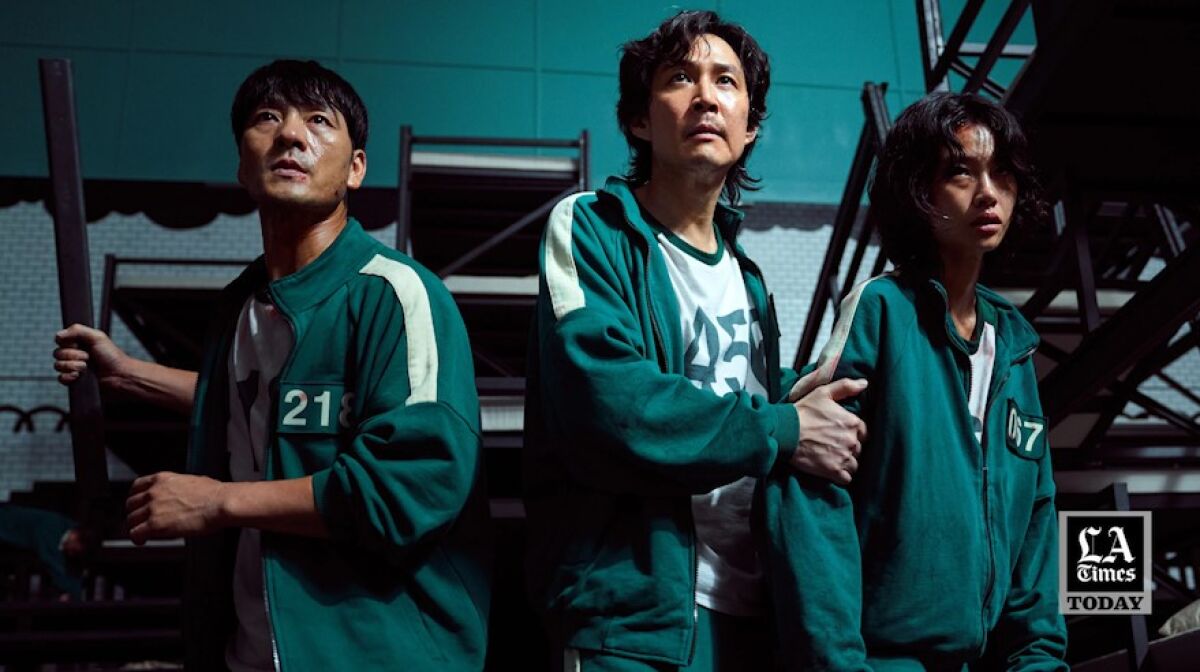
“Squid Game” set a Netflix record of 1.65 billion viewing hours in its first 28 days of release.
But the excitement of those early days has faded as the realities of the company’s business model have set in.
“At first it was exciting to think that people all around the world would be able to watch my show,” said the writer of a popular Netflix drama. “But now I’m thinking, ‘So what?’ I’m not getting anything out of it.”
How to calculate residuals from shows that stream on Netflix is a central issue in the writer’s strike in the United States. In South Korea, the calculation is simple: zero.
Traditionally, television networks have paid writers residuals according to rates set by the Korea Television and Radio Writers Assn., a copyright group that, in the absence of a labor union for scripted television writers, collects and distributes payouts for reruns and foreign licensing deals.
But Netflix has no such agreement with the association.
Instead, the streamer pays generously for scripts, with some A-list writers reportedly doubling their per-episode fee to $150,000.
But for less-established writers, the absence of residuals cuts deeper, given how their deals are structured.
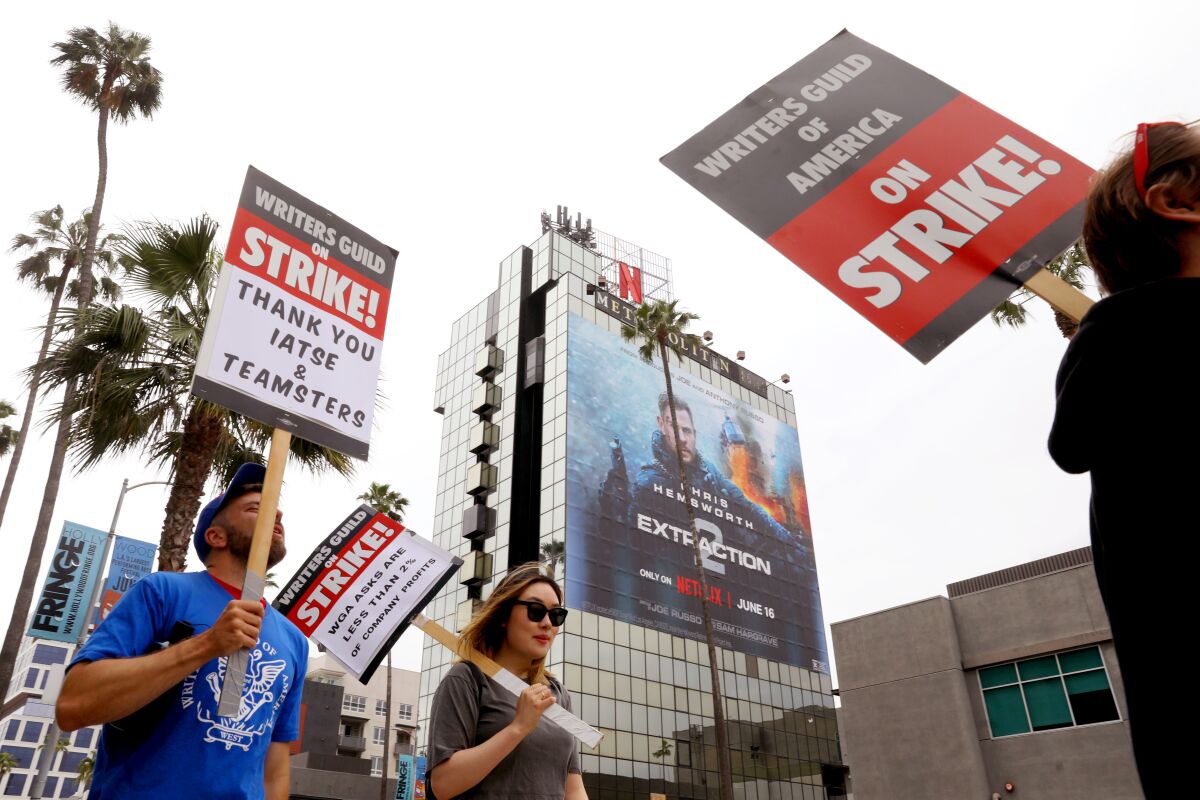
Picketers with the Writers Guild of America strike outside the Sunset Bronson Studios in Hollywood on June 5. Netflix’s business model is a key sticking point in negotiations.
(Gary Coronado / Los Angeles Times)
Writers typically sign long-term contracts with a production company, which will then commission the first few episodes of a potential series with the aim of selling the show and eventually delivering it ready-to-shoot. They are paid 30% of the expected script fee upfront.
An advance at Netflix rates starts at around $30,000, but given the slow pace of writing, pitching, casting and preparing to shoot, a writer typically has to live on that for two or three years before receiving the full script fee.
And all too often, as the drama writer recently experienced, a script bogged down by years of delays and endless rewrites fails to be picked up, and the writer receives no additional payments.
“You have money going out every month so it’s incredibly hard to maintain that without residuals from previous work,” she said.
Seeking another source of income is difficult because writers’ rooms face the same understaffing that forces producers to work 100 hours a week.
“Most Korean dramas are written by one or two main writers, with another one or two assistant writers,” the writer said. “The industry is so used to doing a lot with very little, held together only by creative passion.”
Assistant writers — who are akin to staff writers in Hollywood — typically make close to minimum wage and work long and irregular hours. They are yet another reason production budgets can be kept low.
Some liken the power imbalance between an assistant and a main writer to that of a graduate student and a thesis professor. In addition to writing or researching for scripts, duties might include cleaning the office or making kimchi for the boss.
“I lived with my main writer when I was an assistant, so I had to do some chores here and there,” the drama writer recalled. “But nothing shocking like the stories I heard at the time — like one assistant writer who had to do their main writer’s dirty laundry.”
Assistant writers are almost always uncredited.
“It’s just the sort of practice that makes South Korean content ‘cost-effective,’” said another writer who recently signed a contract for six-part Netflix miniseries.
::
Many in the industry worry that South Korea has locked itself into a path that is unsustainable.
“No matter how much content is being exported right now, unless labor inequalities like the assistant writer system are resolved, we’re going to hit a breaking point,” said the writer currently working on the six-part miniseries. “But a lot of people in the industry have a perverse pride in this — they see the current success of K-content as proof that this system works.”
And as South Korea’s dependence on Netflix only grows deeper, some feel that local production companies have dug themselves into a hole with little room to negotiate for more. “Squid Game” changed the equation for everyone.
“The fact that Netflix was able to create such a global hit for so cheap means that has become their baseline,” said Kim of the Broadcasting Staffs Union. “They know that they can do that in Korea.”
The box office, laid low by the COVID-19 pandemic, has yet to recover. Struggling to keep up with the likes of Netflix or YouTube, television networks have been slashing their scripted programming.
In its statement to the Los Angeles Times, Netflix said that its impact on the industry has been positive.
“Our investments have created employment for thousands of people locally, and our training programs help develop the next generation of Korean talent both behind and in front of the camera,” the company said.
Yet it is because of this singular influence that the industry’s unions believe now is the time to call Netflix to the table.
“Netflix’s impact here makes it much more than just a distributor or an investor,” said Yoo Min-suk, policy director at the Korea Broadcasting Actors Union, which recently requested a meeting with the streamer in hopes of persuading the company to pay its members residuals, which they normally receive for television work. “We believe that they have a duty to bargain with us, alongside with the other streamers and broadcasters.”
But because it outsources its production and is not classified as a direct employer, Netflix is not legally obligated to bargain with unions. And in contrast with Hollywood, where the streamer is a signatory to industry-wide agreements between unions and the Alliance of Motion Picture and Television Producers, no such bargaining exists in South Korea.
Legislative changes could provide an opening. If passed, an amendment to the country’s labor union law that is currently being reviewed in the National Assembly would broaden the definition of an employer to include companies like Netflix, requiring them to negotiate with unions.
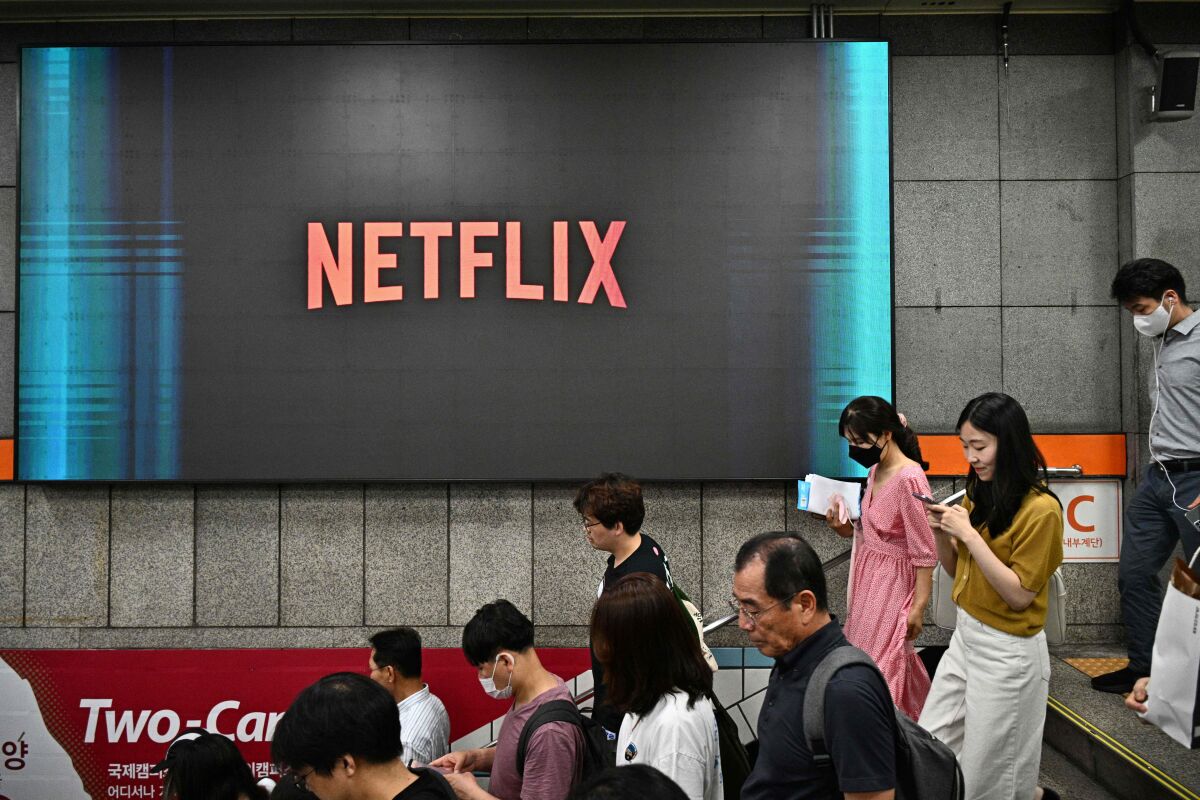
The Netflix logo is seen displayed on a digital monitor in an underground metro station in Seoul on June 22. The company says it’s exempt from having to negotiate with South Korean unions because it is not a direct employer.
(Anthony Wallace / AFP via Getty Images)
The Directors Guild of Korea is taking a similar tack, campaigning for an amendment of South Korea’s copyright law that would give creators ownership of all rights by default and legally mandate the payment of residuals — regardless of what goes into contracts with Netflix.
In a recent visit to South Korea, Netflix co-Chief Executive Ted Sarandos defended the company’s current practices, while also acknowledging the concerns being raised over its business model. “It’s important to us that we remain competitive and promote a healthy ecosystem,” he said. “And in the case of a show’s success, we make sure that creators are compensated in a right manner in the next season.”
This has been the case for “Squid Game” creator Hwang, who said last year that Netflix had given him a “good deal” for the second season of the show, and was exploring “alternative solutions” to the issue of residuals and copyrights.
Still, in February, he threw his support behind the bill that would legally mandate residuals payments to creators.
“I ask you to look beyond the short term and approach this as a step toward nurturing the entire ecosystem,” he said in a recorded video delivered to the National Assembly. “In order for there to be the next ‘Squid Game’ or the next ‘Parasite,’ the livelihoods of creators must be ensured.”
Stay connected with us on social media platform for instant update click here to join our Twitter, & Facebook
We are now on Telegram. Click here to join our channel (@TechiUpdate) and stay updated with the latest Technology headlines.
For all the latest Fashion News Click Here
